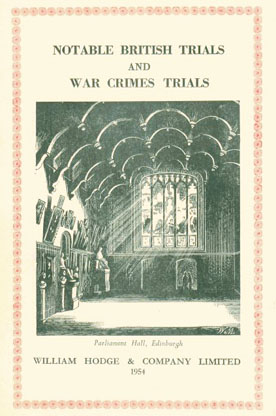
The Notable British Trials Series the first volume of which was published in 1905, has now become a complete library of historical and criminal trials embracing the most famous British cause celebres between 1586 and 1953 (Mary Queen of Scots to the present day).
Founded as a hobby by the late Mr. Harry Hodge, the Series has, in fact, enjoyed an outstanding success and has come to be regarded by many people as one of the greatest British publishing ventures of the twentieth century. Started in a modest way, the trials published by William Hodge and Company, Ltd., now approach the century mark.
A Notable British Trial is neither a "camouflaged thriller" nor a legal text-book. The book's value to the lawyer, historian, and medical man is beyond dispute, and sensation and human interest certainly abound, but its greatest attribute lies un¬doubtedly in its interest for the ordinary member of the community, that wide range of society commonly called the general public.
In view of the fact that trials take place throughout the length and breadth of the country and the very limited accommodation available in the courts, the number of people able to listen to any one trial is extremely small, even though they have the time at their disposal so to do. And yet what takes place in court is carried through in the name of every citizen, the Crown being in reality the People.
It is, therefore, of importance that the public should have the means of studying at leisure in a carefully prepared record the work of the immensely important legal machine. It is right that justice, as we know it in this country, should be without reproach, and that every accused person should have the right of hearing and fair trial before his fellow-citizens.
And it is right, too, that his fellow-citizens should be able to judge of such fairness, which is the very essence of British justice. Unlike the legal codes of certain other countries, a British subject is always innocent of a charge until proved to the satisfaction of the jury that he is guilty of the act preferred against him.
Each volume of the Notable British Trials Series lays the entire case before the reader as it was laid out before the judge and jury. No pains are spared to include the best and fullest information possible in every volume, and official records are consulted whenever these are obtainable. The greatest assist¬ance has always been given to the publishers by the Director of Public Prosecutions and his assistants in London and by the Justiciary Office in Scottish trials.
In many cases charges, speeches and expert evidence are revised either in manuscript or in proof by the judges, counsel and witnesses concerned, and the various police forces at all times give the editors the utmost assistance when requested to do so. Each volume opens with an exhaustive Introduction in which the editor traces the history of the case, and this is followed by a carefully edited verbatim report of the proceedings at the trial, with appendices frequently containing new and unpublished matter. Judgments on Appeal are also given in full, whilst illustrations complete the book.
Every book is-to use the words of Professor Wigmore in Principles of Judicial Proof-"critically edited by a competent and scholarly editor." Quotations from volumes of the Series have been made in Courts of Law and in the House of Commons.
Following on the older Series, and presented in very much the same fashion, the first volume of the War Crimes Trials Series was published in 1948. The object of this series of trials is to present a cross-section of the various crimes committed by minor war criminals against the laws and usages of war and the elementary rights of the human race, during the Second World War.
They are grim reminders of the baseness to which a country' can descend when totalitarianism overthrows democracy and freedom of speech and action no longer exist.
The publishers very much regret that a substantial number of volumes in the Notable British Trials Series are now out of print. These have been so marked, and kept separate, in the list which follows. The inconvenience to readers and collectors is appreciated, and efforts will be made to ensure that these books are made available again as soon as possible.
The task of reprinting so many volumes is, however, formidable under present-day conditions. Second-hand copies are occasionally available, and the student can study these scarcer volumes in good-class libraries.